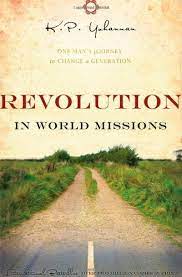Diary of an Apprentice - Book Review
Hannah O'Donnell, 12th October 2021
This week I finished my first book on the apprenticeship reading list: 'Revolution in World Missions'. I thought it would be beneficial to share some of the challenging ideas that K.P. Yohannan brings to light.

'An incredibly convicting and challenging read.'
Every time someone has asked me how I have found reading this book, that has
been my immediate overwhelming thought. K.P. Yohannan is not scared to be
brutally honest about the shortfall of Western countries and what we should be
doing to properly serve as followers of Christ...
The book describes how God is doing great work in Asia, despite the many
challenges.
"Through an indigenous organisation in Thailand, where more than 200 national missionaries are doing pioneering village evangelism, one group personally shared their faith with 10,463 people in two months. Of these 171 gave their lives to Christ, and six new churches were formed…Remember, this great harvest is happening in a Buddhist nation that never has seen such results. Reports like these come to us daily from national outreach teams in almost every Asian nation."
The ‘Revolution’ described, is that it's people from their countries doing the mission work, with no need for western missionaries. The author says that they are able to work more effectively, because they already know the language and the culture.
The revolution in missions needs to continue, argues Yohannan. The role of western churches should be to support those financially, who are already there and better positioned to do the work. He writes:
“Three months ago, I travelled to one South Asian country to visit some of the brothers we support. In one country, I met a Western missionary who had for 14 years been developing some social programs for his denomination. He had come to this country hoping he could establish his mission centre, and he had been successful. As I walked into his mission compound, I passed a man with a gun, sitting at the gate. The compound was bordered by a number of buildings with at least half a dozen imported cars. The staff members were wearing Western clothes, and a servant was caring for one of the missionary children. The scene reminded me of a king living in a palace with his court of serfs caring for his every need. I have, in 18 years of travel, seen this scene repeated many times.
"From conversation with some of the national missionaries,” I continued, “I learned that this missionary and his colleagues did live like kings with their servants and cars. They had no contact with the poor in the surrounding villages. God’s money is invested in missionaries like these who enjoy a lifestyle they could not afford back home—a lifestyle of a rich man, separated by economy and distance from the national missionaries walking barefoot, poorly dressed even by their own standards, and sometimes going without food. These nationals, in my opinion, are the real soldiers of the cross.”
Is that what missionaries are called to live like, or are they supposed to immerse themself into the culture of the country they're in, living in the same circumstances as those they want to reach? Granted, living in poverty without access to clean water, clothes or homes would be immensely difficult, especially having lived comfortable
lives in the West - where we often take basic 'necessities' for granted, but that doesn't mean we can't adapt. We need to be careful about insisting on western ways of mission. This book was K.P. Yohannan's experiences of mission work in India. It clearly describes the work his charity - 'GFA World' - is doing to enable the shift from foreign missionaries doing the work, to national missionaries who understand the culture and the challenges of living in third world countries and the benefits this brings.
Of course, there are some situations where it is right for people to travel from one culture to another to share the gospel and the book also says this.
The book caused me to ask, is the money being directed as I would hope and expect? In a gospel-reflected, Christ-glorifying way? Or does the organisation put their time, efforts and wealth towards giving the 'missionary' a comfortable and luxurious lifestyle - taking advantage of the poverty in the third world nations they are intending to evangelise towards? Are they being clear about where the money donated is going and where it is helping? I could also bring this right down to my own life. I don't have to be abroad to be a missionary - do my actions match what I am trying to share from my life... Am I being a loving servant to others or am I using the title of being a 'Christian' as a means to seem like a 'good' person, to gain popularity or to gain respect amongst true followers of Christ? A real challenge for me, indeed.
So, having now read this book, the challenge to me was how to apply it to my own life. Jesus came to earth to serve others and we should be longing to follow his example, living as a servant to those who don't have what we do. Whether that is someone on our street or someone that lives thousands and thousands of miles from us. In his book, Yohannan speaks of how we can be a servant of Christ and of his people from anywhere on the planet; not only through mission abroad. We can be servants through direct evangelism in our own communities, through showing the love and care of our Lord Jesus Christ, by being generous with our money to all kinds of missionaries that are doing the Lord's work elsewhere and with our time spent in persistent prayer.
Yohannan makes it clear that each of us can be a servant of Christ, serving however God has called us.